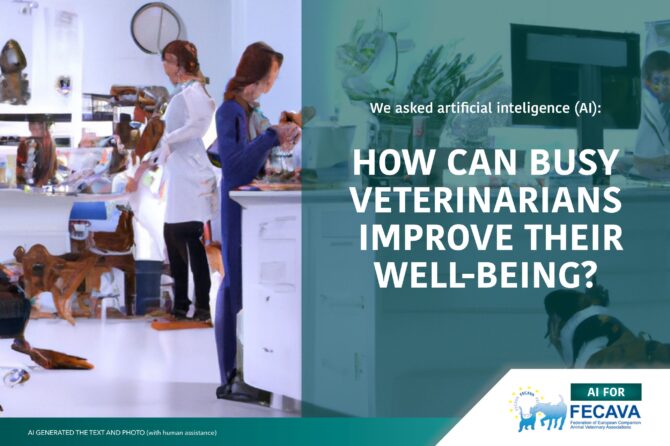
AI for FECAVA: How can busy veterinarians improve their well-being?
Busy veterinarians often face high levels of stress and demanding workloads, which can have a negative impact on their well-being. Here are some strategies that can help busy veterinarians improve their well-being:
- Prioritize self-care: Make self-care a priority by setting aside time for activities that promote physical and mental well-being. This could include regular exercise, getting enough sleep, practicing relaxation techniques like meditation or deep breathing exercises, and engaging in hobbies or activities that bring joy and relaxation.
- Set boundaries: Establish clear boundaries between work and personal life. It’s important to carve out time for personal activities, relationships, and downtime. Avoid taking work home whenever possible, and set realistic expectations for yourself in terms of workload and availability.
- Delegate and seek support: Recognize that you can’t do everything on your own. Delegate tasks to qualified team members whenever possible, such as administrative duties or certain procedures.
- Build a reliable support network of colleagues, friends, or family who can provide emotional support and assistance when needed.
- Practice stress management techniques: Develop healthy coping mechanisms to manage stress. This could involve deep breathing exercises, mindfulness techniques, journaling, or engaging in activities that help you relax and unwind. Regularly assess your stress levels and take steps to address and manage stressors effectively.
- Foster work-life balance: Strive for a healthy work-life balance by scheduling regular time off and vacations. Taking breaks and time away from work can help prevent burnout and recharge your energy. Make sure to fully disconnect during these periods to truly rejuvenate.
- Seek professional support: If you’re feeling overwhelmed or experiencing persistent symptoms of stress, anxiety, or depression, consider seeking support from a mental health professional. They can provide guidance, tools, and coping strategies tailored to your specific needs.
- Engage in professional development: Stay engaged and motivated by pursuing ongoing professional development. This can help you stay up-to-date with advancements in veterinary medicine, expand your knowledge, and enhance your skills. Continuing education, attending conferences, and participating in peer networking can all contribute to professional growth and job satisfaction.
- Cultivate a positive work environment: Foster a supportive and positive work environment by building strong relationships with colleagues and staff. Encourage open communication, teamwork, and collaboration. Celebrate achievements, acknowledge efforts, and provide opportunities for professional growth within the veterinary team.
Remember, prioritizing your well-being is crucial for long-term success and fulfillment as a busy veterinarian. By implementing these strategies, you can improve your overall well-being and maintain a healthier work-life balance.
[text and picture generated by AI: ChatGPT and DALL-E]
Leave a reply

Leave a reply